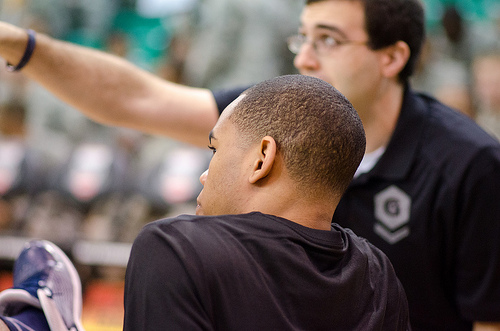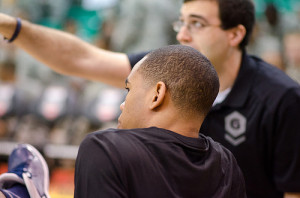Developing Relationships with Senior Players


Many coaches can easily observe the relationships between coaches and senior players through the media. Even if an individual has never coached in this environment, a simple scroll through any sports news website or quick look at the sports section of a paper will reveal numerous examples of the difficulties faced by those in these positions. Challenges such as money, playing time, opportunity and clashes in philosophy are just some of the more common reasons sighted for conflict that can lead to a dysfunctional team, and in turn, a poor season as a result of underperforming.
The difficulties in managing senior players as they move from a junior mentality to the distractions of being their own person can be difficult because of the unique situation many players find themselves in. In small team sports such as basketball, players can come from very different backgrounds and have followed a great variety of different paths to reach their current position. This means different values and the importance placed upon different aspects of a relations for each individual.
There are however a few points which may help identify possible problems earlier so small issues can be dealt with before they become big problems, or it might be just a case of having more time to deal with these issues allowing cooler heads to prevail instead of heated words and emotions getting the better of everyone involved.
One situation that helps create a basis for dialogue is to have an opportunity for players to speak with a coach. We are not talking about during training sessions, but maybe before or after training and in some cases away from the court completely. If a player feels that there is an opportunity to talk, this might be the catalyst that is needed in allowing a player to come forward and clear the air of any issue they maybe experiencing.
Always respond to a player in a respectful and honest manner. Too many times one person behaving badly is often seen as justification for both individuals involved in conflict to act poorly. This does not have to be the case. Players because of the physicality of sport and emotional drive often needed at senior levels lose their ability to exercise perfect judgement. By displaying greater character in these situations, coaches have an opportunity to later reflect on the situation with the player and discuss how to better handle this situation next time.
Define the issue. Many of the earlier mentioned problems to do with how a team functions are very similar to those of junior athletes. Except at the senior level, there is often more at stake such as career opportunities. This makes the stakes all the more higher and a coach must respond with a more defined and well throughout reasoning when questioned about their philosophy, selections and strategies. This will happen for most coaches as they develop into the mould of a senior coach, however, having a philosophy, and being able to articulate it are often two very different things. Especially when confronted with a senior player who is less likely to just accept a reason without it making sense to them.
Understand the hierarchy within the team environment. Rookies or junior players entering into a senior team will have a different set of needs and experience different challenges to those of more established or veteran players. In a team all players will play a role, understanding though the individual’s needs, wants, strengths and weaknesses will allow a coach to truly get the most out of each individual without risking the stability of the group by making obvious exceptions to behaviour or expectations. Having the ability to explain a message to new players on their level, while selling the ideal to the established players, and then planting the seed for leaders of the group to adopt this philosophy is where the real skill is at.
The journey for each of the senior players within a team is different. Many stories sound the same, but it is these little differences, the side stories and experiences that help build a real connection with individuals that facilitates trust and goodwill. For senior players these can be the difference between leaving and staying within a team environment even though some things are not to their absolute liking.


Leave a Reply